#melchisedech
Photo
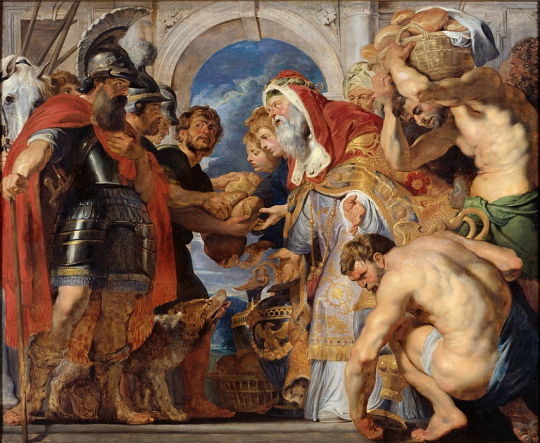
Die Begegnung von Abraham und Melchisedech by Peter Paul Rubens (1616, Gemälde)
#kunst#kunstwerk#art#artwork#peter paul rubens#abraham#melchisedech#melchizedek#religion#christentum#christianity#bibel#bible#gemälde#painting#glaube#faith
41 notes
·
View notes
Text

0 notes
Text
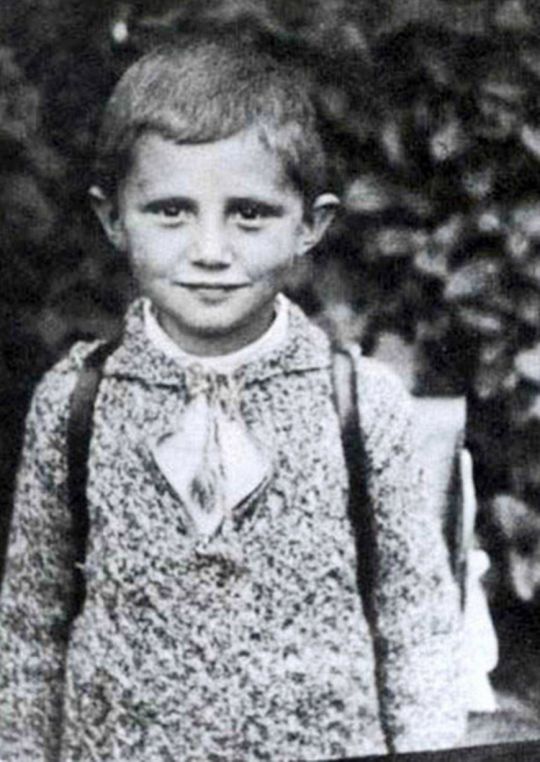
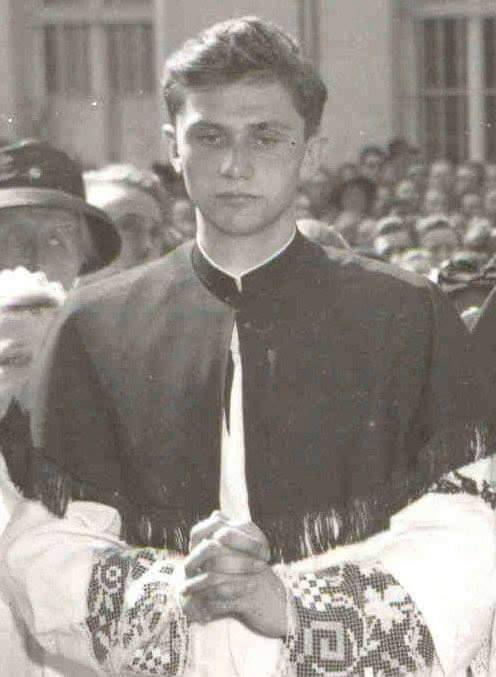
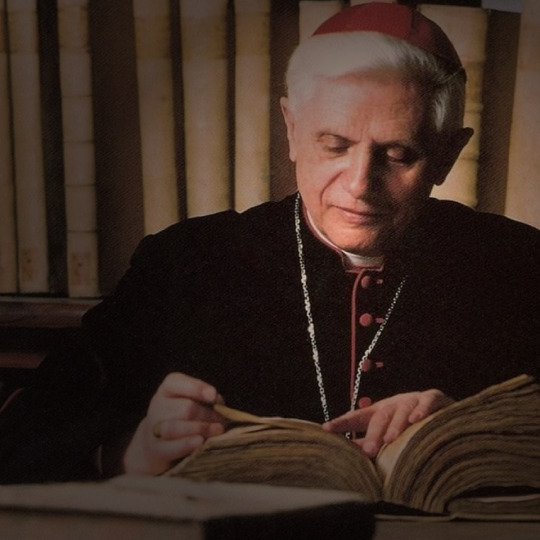
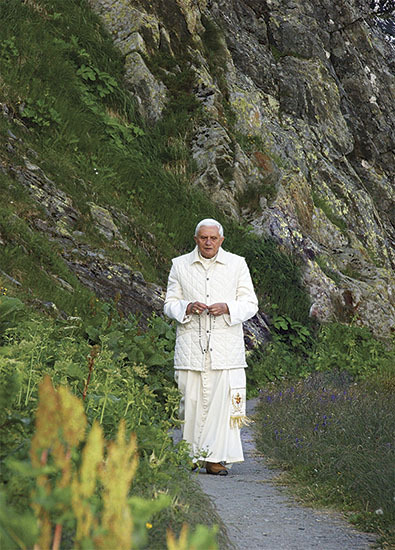
"Tu es sacerdos in aeternum,
secundum ordinem Melchisedech."
Requiescat in pace. 31.12.2022
598 notes
·
View notes
Text
what if we were melchisedech and the saladin from a french decameron manuscript... and we held hands... ha ha jk... unless...

20 notes
·
View notes
Text
Tudo que você faz para alguma pessoa o mesmo talvez jamais fará igual. O karma é delas, não o seu ! Não espere princípios de honra, honre seus princípios e tenha compaixão.
-Melchisedech Krajewski
11 notes
·
View notes
Text
Catechism of Pope Saint Pius X
The Apostle’s Creed
The Second Article of the Creed
1. Q. What are we taught in the Second Article: And in Jesus Christ His only Son our Lord?
A. The Second Article of the Creed teaches us that the Son of God is the Second Person of the Blessed Trinity; that, like the Father, He is God eternal, omnipotent, Creator and Lord; that He became man to save us; and that the Son of God, made man, is called Jesus Christ.
2. Q. Why is the Second Person called the Son?
A. The Second Person is called the Son, because He is begotten by the Father from all eternity by way of intelligence; and for this reason He is also called the Eternal Word of the Father.
3. Q. Since we also are sons of God, why is Jesus Christ called the only Son of God the Father?
A. Jesus Christ is called the only Son of God the Father, because He alone is His Son by nature, whereas we are His sons by creation and adoption.
4. Q. Why is Jesus Christ called our Lord?
A. Jesus Christ is called our Lord, because, not only did He as God, together with the Father and the Holy Ghost, create us; but He has also as God and Man redeemed us.
5. Q. Why is the Son of God, made man, called Jesus?
A. The Son of God, made man, is called Jesus, that is to say, Saviour, because He has saved us from the eternal death merited by our sins.
6. Q. Who gave the name of Jesus to the Son of God, made man?
A. The Eternal Father Himself, through the Archangel Gabriel, gave the name of Jesus to the Son of God made man, at the moment when the Archangel announced to the Blessed Virgin the mystery of the Incarnation.
7. Q. Why is the Son of God made man also called Christ?
A. The Son of God made man is also called Christ , that is to say, anointed or consecrated, because kings, priests and prophets were anointed of old; and Jesus is the King of kings, High Priest, and supreme Prophet.
8. Q. Was Jesus Christ really anointed and consecrated with a material anointing?
A. The anointing of Jesus Christ was not material, like that of the kings, priests and prophets of old, but wholly spiritual and divine, because the fullness of the Divinity dwells in Him substantially.
9. Q. Had men any idea of Jesus Christ previous to His coming?
A. Yes, previous to His coming men had some idea of Jesus Christ in the promise of the Messiah, which God made to our first parents, Adam and Eve, and which He renewed to the holy Patriarchs; and also in the prophecies and the many figures which foreshadowed Him.
10. Q. How do we know that Jesus Christ is truly the Messiah and Promised Redeemer?
A. We know that Jesus Christ is truly the Messiah and Promised Redeemer from the fact that in Him are verified: (1) All that the prophecies foretold, (2) And all that the figures of the Old Testament foreshadowed.
11. Q. What did the prophecies foretell of the Redeemer?
A. Regarding the Redeemer, the prophecies foretold the tribe and the family from which He was to come; the place and time of His birth; His miracles and the most minute circumstances of His Passion and Death; His Resurrection and Ascension into heaven; and His spiritual, perpetual and universal Kingdom, that is, the Holy Catholic Church.
12. Q. Which are the principal figures of the Redeemer in the Old Testament?
A. The principal figures of the Redeemer in the Old Testament are: the innocent Abel; the High Priest Melchisedech; the sacrifice of Isaac; Joseph sold by his brethren; the prophet Jonas; the Paschal Lamb; and the Brazen Serpent set up by Moses in the desert.
13. Q. How do you know that Jesus Christ is true God?
A. We know that Jesus Christ is true God: (1) From the testimony of the Father saying: This is My beloved Son in whom I am well pleased, hear ye Him; (2) From the attestation of Jesus Christ Himself, confirmed by the most stupendous miracles; (3) From the teaching of the Apostles; (4) From the unvarying tradition of the Catholic Church.
14. Q. Mention the chief miracles wrought by Jesus Christ?
A. Besides His Resurrection, the chief miracles wrought by Jesus Christ are; the restoring of health to the sick, of sight to the blind, of hearing to the deaf, and of life to the dead.
10 notes
·
View notes
Text
Le pape émérite Benoît XVI va...
Le pape émérite Benoît XVI va…
La curie romaine a annoncé le rappel à Dieu du pape Benoît XVI le 31 décembre 2022.
Prêtre à jamais selon l’ordre de Melchisedech, de nationalité allemande, le pape Benoît XVI, de son vrai nom Joseph RATZINGER fut l’un des visages et l’une des autorités de l’Eglise catholique de rites romains les plus respectés. À la tête de la commission qui a oeuvré pendant longtemps sous le St Pape Jean Paul…

View On WordPress
0 notes
Text
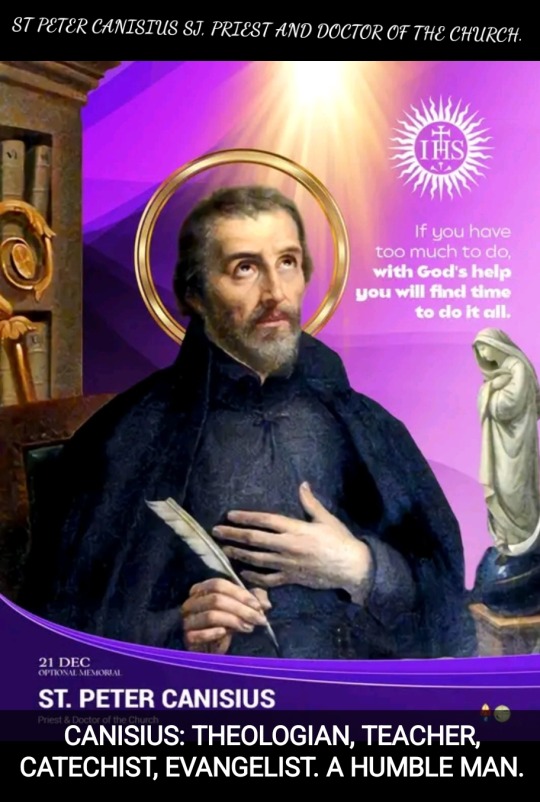
“We ought to instruct with meekness
those whom heresy has made bitter and suspicious
and has estranged from orthodox Catholics,
… Thus, by whole-hearted charity and goodwill, we may win them over to us in the Lord.” (St Peter Canisius SJ, Doctor of the Church).
"Mary set out in those days and traveled to the hill country in haste to a town of Judah, where she entered the house of Zechariah and greeted Elizabeth.
"When Elizabeth heard Mary’s greeting, the infant leaped in her womb, and Elizabeth, filled with the Holy Spirit, cried out in a loud voice and said,
“Most blessed are you among women, and blessed is the fruit of your womb.
"And how does this happen to me, that the mother of my Lord should come to me? For at the moment the sound of your greeting reached my ears, the infant in my womb leaped for joy.
"Blessed are you who believed that what was spoken to you by the Lord would be fulfilled.” (Luke 1: 39 - 45).
Wednesday 21st December 2022 of the 4th Week of Advent is the feast of St Peter Canisius SJ, Priest and Doctor of the Church.
"Besides being a sage, Qoheleth taught the people what he himself knew, having weighed, studied and emended many proverbs. Qoheleth took pains to write in an attractive style and by it to convey truths(Ecclesiastes 12: 9-10).
Peter Canisius was born in Nijmegen, Holland in 1521. Peter studied canon law at Cologne University and Louvain. After his studies, he joined the Society of Jesus (the Jesuits) and distinguished himself in teaching, preaching and writing. Peter Canisius became a type of Qoheleth (Ecclesiastes 12: 9-10, 12). He was a sage who shared liberally the fruits of his arduous studies in many books. "When I discovered your teaching, I devoured it. Your words brought me joy and gladness; you have called me your own, O Lord my God." (Jeremaiah 15:16) Peter Canisius could say the same thing.
In 1555, St Peter Canisius published his famous Catechism, (Summa Doctrinae Christianae), which was the Catholic answer to Luther's great work. This Catechism which was translated into more than 16 languages during Peter Canisius's life became a model for catechisms up to this day. The Lord sustained Peter in the priesthood till the end of his life: "The Lord has sworn an oath and he will not retract; you are a priest forever, in the line of Melchisedech" (Psalm 110:4)
St Peter Canisius died in 1597 and was canonized and declared a saint and Doctor of the Church in 1925. "He shall receive a blessing from the Lord, a reward from God his savior. Such is the race that seeks for him, that seeks the face of the God of Jacob." (Psalm 24: 5-6) His feast day is today, December 21.
In our key Scripture from Luke, Elizabeth made two revelations through the power of the Holy Spirit :
#1. The Mother of my Lord visits me. Christ Jesus is Lord and God.
#2. Mary, you are made completely righteous because like Abraham and David you dared to believe the promises of God to you. Faith is the passport to righteousness and eternal life.
And you Reader, do you believe in the promises of God to you?
The period of waiting and expectations will soon be over. You receive in proportion to your desire and expectations. Believe! Believe! Believe!
Daily Bible Verse @ Seekfirstcommunity.com
0 notes
Text
Pray delivers from a cult ( catholic ) but keeps serving the Lord For Lord delivered me through a Gideon Bible
The reason “there is no possibility to appeal” the defrocking of Fr. Frank Pavone is because the decision has already been approved by the NWO honorary chaplain.
Let that sink in. That which the satanic Planned Parenthood had been unable to achieve for decades has been accomplished by the demonic fake-pope himself — the removal of the single-most effective pro-life communicator, organiser and activist — bar none — from priestly ministry.
“Pope Francis” is easily the most evil man alive in the Catholic Church today — but then faithful Catholics have already known that for many years. May God take him soon.
And as for Fr. Pavone — Tu es sacerdos in aeternum secundum ordinem melchisedech.
https://www.ncregister.com/cna/breaking-vatican-dismisses-father-frank-pavone-from-priesthood
0 notes
Text
Subject: What is the Significant of Melchizedek
References:
Gen 14:18-20
Psalm 76:2
Psalm 110
Hebrews 6
Hebrews 7:1-10
Hebrews 7:2
Melchizedek, also spelled Melchisedech, in the Hebrew Bible (Old Testament) a figure of importance in biblical tradition because he was both King and Priest, And was connected with Jerusalem and was revered by Abraham who paid a Tithe to him.
He appears as a person only in an interpolated vignette (Gen 14:18–20) of the Story of Abraham Rescuing His Kidnapped Nephew, Lot, by defeating a coalition of Mesopotamian Kings under Chedorlaomer.
Melchizedek was revered by Abraham who paid a tithe to him. He appears as a person only in an interpolated vignette (Gen 14:18–20) of the story of Abraham rescuing his kidnapped nephew, Lot, by defeating a coalition of Mesopotamian kings under Chedorlaomer.
In this event, Melchizedek meets Abraham on his return from battle, gives him bread and wine (which has been interpreted by some Christian Scholars As A Precursor of the Eucharist, so that Melchizedek’s Name Entered The Canon Of The Roman Mass) and Blesses Abraham in the Name of “God Most High” (in Hebrew El ʿElyon). In return, Abraham gives him A Tithe Of The Booty.
Melchizedek is an Old Canaanite Name Meaning “My King Is [the God] Sedek” or “My King Is Righteousness” (the meaning of the similar Hebrew cognate). Salem, of which he is said to be King, is very probably Jerusalem.
Psalm 76:2 refers to Salem in a way that implies that it is synonymous with Jerusalem, and the reference in Gen 14:17 to “the King’s Valley” further confirms this identification.
The god whom Melchizedek serves as priest is “El ʿElyon,” again a name of Canaanite origin, probably designating the high god of their pantheon. (Later, the Hebrews adapted another Canaanite name as an appellation for God.)
For Abraham to recognize the authority and authenticity of a Canaanite Priest-King is startling and has no parallel in Biblical Literature.
Psalm 110, in referring to a future Messiah of the Davidic line, Alludes to the Priest-King Melchizedek as a Prototype of this Messiah.
This Allusion led the author of the Hebrews (Apostle Paul) in the New Testament to translate the name Melchizedek as “King of Righteousness” and Salem as “Peace” so that Melchizedek is made to Foreshadow of Christ, stated to be the True King of Righteousness and Peace (Hebrews 7:2).
According to the analogy just as Abraham, the ancestor of the Levites, paid a tithe to Melchizedek and was therefore his inferior, so the Melchizedek-Like Priesthood of Christ is Superior to that of the Levites.
Now may the God and Father of our Lord Jesus Christ, and the Eternal High Priest Himself, the Son of God, Jesus Christ, build us up, and all Christians, in Faith and Truth, and in all Gentleness and in all Freedom from Anger and Forbearance and Steadfastness and Patient Endurance, Amen.
WORD
Servant DCarlos Phipps
0 notes
Text
ŚLADAMI HARREGO POTTERA - Wycieczka Szkolna Autokarem
Further down Saint Jerome appears with his ear-trumpet; he takes up the trumpet and puts it down; he writes, and takes up the trumpet; and the book appears with considerable light and considerable darkness (clarification: Saint Jerome translated the Hebrew bible of his time into Latin, a work which was called the Vulgate, the Church’s official bible until the Palmarian). Besides, there was more than one mystical intervention to settle different questions, for example, a very beautiful vision of the Most Blessed Virgin Mary as Queen Essenia, seated on a throne above the then Lake of Essenia (today the Dead Sea), venerated by a multitude of Angels chanting Her name, whose meaning is ‘holy’, in order to confirm the manifestation of Mary’s Soul as consort to Most Holy Melchisedech in Abraham’s time. The Holy Palmarian Bible is the Magnum Opus of the two Palmarian Holy Councils (1980-1992; 1995-2002), in the course of which the existence of falsifications in the sacred bible text became sadly ever more evident.
There are several episodes narrated by the Evangelists with texts which appear to conflict with each other, the explanation being that the episode occurred more than once: For instance, three were Saint Peter’s confessions in July of the year 33; three were the announcements by Jesus of Saint Peter’s denials, and three of Judas Iscariot’s betrayal, etc. Then, below wypracowanie , appear the following words: ‘Permission and mystery’. Another series was owing to King Manasses of Judah and Samaria united, in order to cover up the ruinous consequences of his idolatrous government, and make believe that none of the preceding kings had been good, both of the Kingdom of Judah and of the Kingdom of Samaria; so that in the falsified text all the kings of Samaria appear to be bad, when in reality there were four holy kings among them, namely Jehu, Joachaz, Jeroboam II and Faceas.
In the course of the Council work, several series of adulterations were encountered in the sacred texts: for example, one series in the Books of Moses, owing to levitical priests downgrading the great Caudillo and giving greater credit to his brother Aaron, the first Levitical High Priest. King Solomon was responsible for another series in order to disparage his father, King Saint David, and thus cover up his own iniquity and bad government. Not surprisingly, certain Jewish groups have already started complaining that the IPN has become “politicized” at the hands of Poland’s (leftist-demonized) PiS government. And the Book of the Apocalypse likewise needed considerable restoration to become what it is today: a stupendous guide, easy to read, for understanding the times in which we live and those to come up until the Last Judgement, and beyond. Those words oppose the truth, oppose everything already defined for centuries and centuries by the Church: that the Virgin Mary was Virgin in childbirth, before childbirth and after childbirth, that is, perpetual Virgin.
The true text says that this general circumcision was of all those converted through the apostolate carried out by Most Holy Melchisedech throughout the Land of Canaan prior to the conquest, as stated in the Book of Wisdom, and those converts thus joined the Jewish People with full rights, and were aggregated to the different tribes. Already in the second year of the First Palmarian Holy Council, this great biblical task could be foreseen owing to zaś vision of Pope Saint Gregory XVII on the 21st of May 1981 in the Mother House of the Order in Seville, which he himself relates: “I saw a large book, and the Holy Ghost with a quill in His beak tracing out writing, and that Book appears entirely full of light. Next is seen a book in which all the mysteries appear: only one book was written with full inspiration, and that book no longer exists. The masoretic bible (clarification: this is the bible of the Judaic sect, namely the Old Testament) is written by several people, and the same occurs as with the ear-trumpet, for the book appears with light and much darkness; and then upon the Hebrew text, some gestures are seen of jews making capricious changes.
1 note
·
View note
Text
Artysta Żyje I Idzie W Stolicy
From the Epistles of the Apostles almost all references to the Sacraments, as also to the Most Holy Virgin Mary, had been eliminated, and also required a work of restoration. Thanks to decades of Holocaust supremacism, the average westerner thinks only of the lot of the Jews, and has a very difficult time fully grasping the fact that Poles were also victims of Nazi Germany, even when he/she has been informed of this. This is their focus and concern so they don’t deal with a lot of the concerns that arise for other peoples in a very different worldview like ours. Since the biblical texts don’t even mention the Hyksos name, the name of this particular king (Pharaoh) or indeed give us any very helpful details about the king or dynasty, it is clear that these details were not important to the purpose and message of the scriptures to the community they were originally written for. The Germans used the POLICJA GRANATOWA for anti-Jewish acts, but it is conveniently forgotten, by the Holocaust establishment and the media, that the Germans also used the POLICJA GRANATOWA for anti-Polish acts. The POLICJA GRANATOWA was a German-conscripted version of the prewar Polish police.
Tomasz Domanski does not mince words as he shows us how Jan Grabowski’s portrayal of the Polish Blue Police (POLICJA GRANATOWA) has, in Domanski’s words, “little in common with reality”. These texts don’t answer all our questions, partly because the questions we want to ask are not the ones they deal with. The questions that arise to us in our time, from our great distance away in time and cultural worldview, were not important to that culture and people. The true text says that this general circumcision was of all those converted through the apostolate carried out by Most Holy Melchisedech throughout the Land of Canaan prior to the conquest, as stated in the Book of Wisdom, and those converts thus joined the Jewish People with full rights, and were aggregated to the different tribes. With the Greek Bible called the Septuagint the same occurs as with the trumpet; and the book appears with light and darkness. Further down Saint Jerome appears with his ear-trumpet; he takes up the trumpet and puts it down; he writes, and takes up the trumpet; and the book appears with considerable light and considerable darkness (clarification: Saint Jerome translated the Hebrew bible of his time into Latin, a work which was called the Vulgate, the Church’s official bible until the Palmarian).
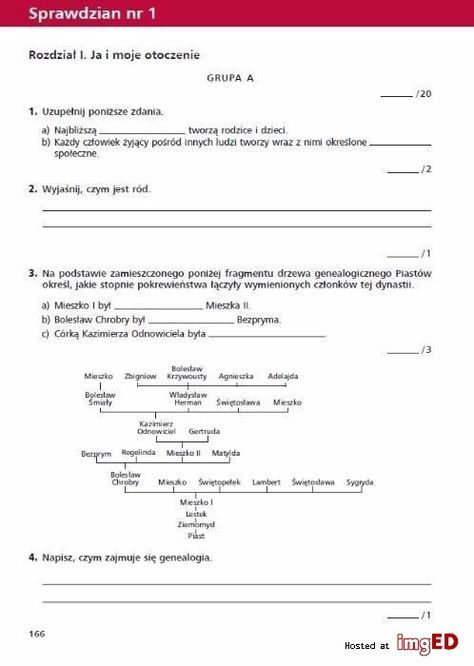
He could have pointed out that the German retention of part of the lower-level Polish administration had nothing więc do with any German hope that Poles would collaborate. As though Moses would not have watched closely over the observance of this law! Again, membership was not voluntary. Owing to the fact that there are so many accusations debunked by Domanski, and most readers are probably not interested in wading through innumerable technical details, I consider one example-that of the Nazi German liquidation of the Jews of Stoczk. Now consider the WOJT and the SOLTYSZ (village mayors). It was not. The Polish village mayors were part of the German-directed lower-level administration. It helps to keep in mind that our questions, our needs and interests, our cultural curiosities are not why they were originally written. Who Were kartkówka ? From the Hyksos period, the eastern border of Egypt was never closed as in the old Egyptian period. Canaan's border was a scene of trade and migration even after the overthrow of the Hyksos and was part of the Egyptian sphere, for better or for worse, into modern times.
King Solomon was responsible for another series in order to disparage his father, King Saint David, and thus cover up his own iniquity and bad government. In the course of the Council work, several series of adulterations were encountered in the sacred texts: for example, one series in the Books of Moses, owing to levitical priests downgrading the great Caudillo and giving greater credit to his brother Aaron, the first Levitical High Priest. Another series was encountered in the tendency to disparage converts, even eliminating entire episodes. For this reason, though trembling in the face of the magnitude of the task, Pope Saint Gregory XVII ordered the redaction of a Palmarian Sacred History, which would include all the sacred books and eliminate the falsifications. Failure to report for duty meant severe punishment. What did you have for dinner yesterday? Perhaps ironically, Poles did not steal from Jews. It is clear that the Bible text is not concerned about the historical identity of most peoples, in our idea of history. One example of adulteration in the books of Moses: the falsified text states that circumcision was not carried out during the forty years in the desert.
During the era of history in focus, Semitic groups from Canaan apparently were used to migrating into the northeastern Delta areas of Egypt to graze and get food during famine times, as portrayed in the story. And no wonder. The IPN no longer unilaterally promotes the standard Holocaust narrative quite the way it used to. That, unfortunately, is part and parcel of the standard Holocaust narrative, which saturates much of Western thinking, and which serves various geopolitical agendas, one of which is anti-Polonism. It shows the many ways that Grabowski and Engelking falsify history as part of their Poles-are-horrible storytelling. We continue to probe the scriptures and other ancient texts, archaeology and the glimpses of history we savor as part of our own common human heritage! The average westerner who reads Grabowski or Engelking gets no inkling of the fact that a Jew who fled the ghetto, for the Polish countryside, continued to function in i world of unmitigated German terror, and that this terror was faced by the Pole as well as the Jew. For the longest time, Polish governmental and educational institutions have scrupulously avoided responding to Jewish accusations against Poland. The meme of the greedy and (what else?) anti-Semitic villainous Catholic Pole helping himself to Jewish property, with its obvious Poles-owe-Jews undercurrent as per the Holocaust Industry, was popularized by post-Stalinist Jan T. Gross, especially in his GOLDEN HARVEST.
1 note
·
View note
Photo
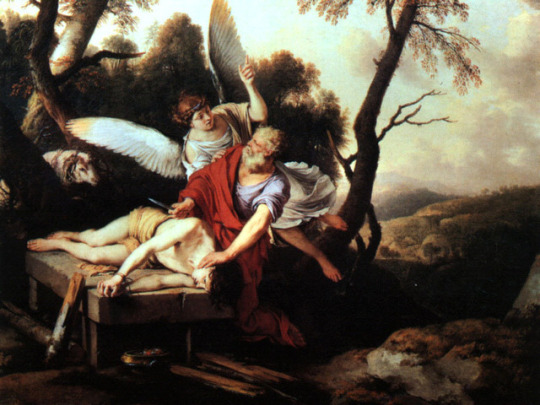
Why God Tested Abraham
Full Question
Why did God test Abraham and ask him to sacrifice his son?
Answer
In asking Abraham to sacrifice his son, God was not testing him for his own information but for that of Abraham. Up until this point Abraham did not know that he had such faith within himself. In making such a difficult request, God actually drew the best out of Abraham. This is why he gives each of us the crosses we have.
God had big plans for Abraham, who was to become the father of many nations and most of all our "father in faith" as our liturgy proclaims: “Look with favor on these offerings and accept them as once you accepted the gifts of your servant Abel, the sacrifice of Abraham our father in faith, and wine offered by your priest Melchisedech.”
#Catholic Answers#Ask An Apologist#Fr. Vincent Serpa#Abraham and Isaac#Old Testament History#Melchisedech
39 notes
·
View notes
Text

@electronicosmosis-deuce how would transubstation have given the Vatican any political power that consubstantion wouldn’t have? The Church fathers have always said that the Eucharist is fully Christ’s body and blood, despite retaining all the accidents of bread and wine. Just because St. Thomas Aquinas formalized the language doesn’t mean that it was invented in his lifetime.
“You ought to know what you have received, what you are going to receive, and what you ought to receive daily. That Bread which you see on the altar, having been sanctified by the word of God, is the Body of Christ. The chalice, or rather, what is in that chalice, having been sanctified by the word of God, is the Blood of Christ” (St. Augustine of Hippo, Sermons, circa 400 AD).
“After the type had been fulfilled by the Passover celebration and He had eaten the flesh of the lamb with His Apostles, He takes bread which strengthens the heart of man, and goes on to the true Sacrament of the Passover, so that just as Melchisedech, the priest of the Most High God, in prefiguring Him, made bread and wine an offering, He too makes Himself manifest in the reality of His own Body and Blood” (St. Jerome, Commentaries on the Gospel of Matthew, 398 AD).
“Thus, every soul which receives the bread which comes down from heaven is a house of bread, the bread of Christ, being nourished and having its heart strengthened by the support of the heavenly bread which dwells within it” (St. Ambrose of Milan, Letter to Horontianus, circa 387 AD).
“I wish to add something that is plainly awe-inspiring, but do not be astonished or upset. This Sacrifice, no matter who offers it, be it Peter or Paul, is always the same as that which Christ gave His disciples and which priests now offer: The offering of today is in no way inferior to that which Christ offered, because it is not men who sanctify the offering of today; it is the same Christ who sanctified His own. For just as the words which God spoke are the very same as those which the priest now speaks, so too the oblation is the very same” (St. John Chrysostom, Homilies on the Second Epistle to Timothy, circa 397 AD).
“Since then He Himself has declared and said of the Bread, (This is My Body), who shall dare to doubt any longer? And since He has affirmed and said, (This is My Blood), who shall ever hesitate, saying, that it is not His blood?” (St. Cyril of Jerusalem, Catechetical Lectures, circa 350 AD).
“This food we call the Eucharist, of which no one is allowed to partake except one who believes that the things we teach are true, and has received the washing for forgiveness of sins and for rebirth, and who lives as Christ handed down to us. For we do not receive these things as common bread or common drink; but as Jesus Christ our Savior being incarnate by God’s Word took flesh and blood for our salvation, so also we have been taught that the food consecrated by the Word of prayer which comes from him, from which our flesh and blood are nourished by transformation, is the flesh and blood of that incarnate Jesus” (St. Justin Martyr, First Apology, circa 150 AD).
“Consider how contrary to the mind of God are the heterodox in regard to the grace of God which has come to us . . . They abstain from the Eucharist and from prayer, because they do not admit that the Eucharist is the flesh of our Savior Jesus Christ, the flesh which suffered for our sins and which the Father, in His graciousness, raised from the dead.” (St. Ignatius of Antioch, Letter to the Smyrnaeans, circa 90 AD).
Consubstantiation isn’t just bad theology, it’s bad philosophy. If a thing is wholly Jesus, how can it also remain bread? It acts as if Jesus is ‘possessing’ bread instead of transforming it, which is, quite frankly, emblematic of the problem with Lutheranism as a whole. It denies the truly transformative power of Christ’s sacrifice, claiming that our sinful natures are covered instead of redeemed.
99 notes
·
View notes
Photo
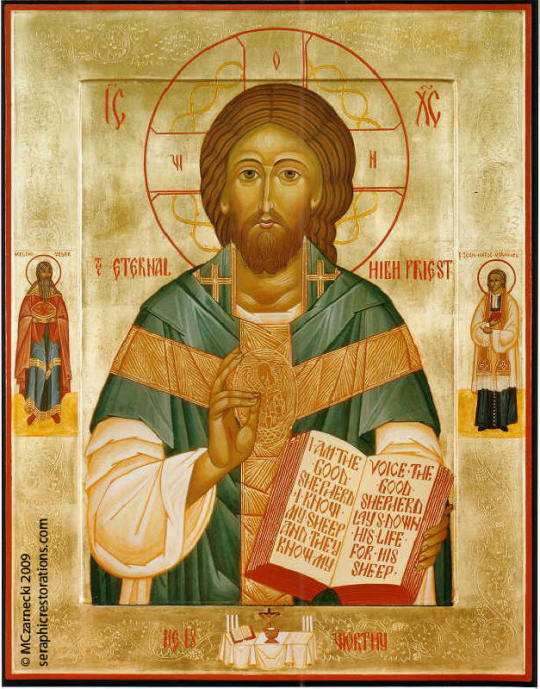
Votive Mass Of Our Lord Jesus Christ, Supreme And Eternal Priest - Propers
(Missa de D. N. Iesu Christo summo et æterno Sacerdote)
Missa ‘Juravit Dóminus’
White
3rd Class +++++ INTROIT (Ps. 109. 4) Juravit Dóminus, et non pœnitébit eum: Tu es sacérdos in ætérnum secúndum órdinem Melchísedech. – Psalm. Dixit Dóminus Dómino meo: Sede a dextris meis. Glória Patri …– Juravit Dóminus… The Lord hath sworn, and He will not repent: Thou art a priest for ever according to the order of Melchisedech. Ps. ibid. 1. The Lord said to my Lord: Sit thou at my right hand. Glory be to the Father … – The Lord … +++++ COLLECT Deus, qui ad majestátis tuæ glóriam et géneris humáni salútem, Unigénitum tuum summum atque ætérnum constituísti Sacerdótem: præsta; ut quos minístros et mysteriórum suórum dispensatóres elégit, in accépto ministério adimpléndo fídéles inveniántur. Per eúmdem Dóminum … Glória in excélsis… O God, who for the glory of Thy Majesty and the salvation of the human race, didst establish Thine only begotten Son as the supreme and eternal Priest: grant that those He has chosen to dispense His mysteries may prove loyal in carrying out the ministry they have received. Through the same … +++++ EPISTLE
From Blessed Paul the Apostle to the Hebrews, 5. 1-11.
[The Epistle of the Mass reminds us that Christ is a Priest
and the example of all Priests and Bishops.] Fratres: Omnis Póntifex ex homínibus assúmptus, pro homínibus constituítur in iis, quæ sunt ad Deum, ut ófferat dona, et sacrifícia pro peccátis: qui condolére possit iis, qui ignórant, et errant: quóniam et ipse circúmdatus est infirmitáte: et proptérea debet, quemádmodum pro pópulo ita étiam et prosemetípso offére pro peccátis. Nec quisquam sumit sibi honórem. sed qui vocátur a Deo, tamquam Aaron. Sic et Christus non semetípsum clarificávit ut póntifex fierret, sed qui locútus est ad eum: Fílius meus es tu: ego hódie génui te. Quemádmodum et in álio loco dicit: Tu es Sacérdos in ætérnum secundum órdinem Melchísedech. Qui in diébus carnis suæ preces supplicationésque ad eum, qui possit illum salvum fácere a morte, cum clamóre válido et lácrymis ófferens, exaudítus est pro sua reveréntia. Et quidem cum esset Fílius Dei didicit ex iis, quæ passus est obediéntiam: et consummátus, factus est ómnibus obtemperántibus sibi, causa salútis ætérnæ, appellátus a Deo póntifex juxta órdinem Melchísedech. De quo nobis grandis sermo, et ininterpretábilis ad dicéndum.
Bretheren: Every high priest taken from among men, is ordained for men in the things that appertain to God, that he may offer up gifts and sacrifices for sins; who can have compassion on them that are ignorant and err: because he himself also is compassed with infirmity. And therefore he ought, as for the people, so also for himself, to offer for sins. Neither doth any man take the honour to himself, but he that is called by God, as Aaron was. So Christ also did not glorify himself, that He might be made a high priest: but He that said unto Him: Thou art my Son, this day have I begotten Thee. As He saith also in another place: Thou art a priest for ever, accordingto the order of Melchisedech. Who in the days of his flesh, with a strong cry and tears, offering up prayers and supplications to Him that was able to save Him from death, was heard for His reverence. And whereas indeed He was the Son of God, He learned obedience by the things which He suffered: and being consummated, He became, to all that obey Him, the cause of eternal salvation. Called by God a high priest according to the order of Melchisedech. Of whom we have to say, and hard to be intelligibly uttered. +++++ GRADUAL (Luke 4. 18) Spiritus Dómini super me, propter quod unxit me: Evangelizáre paupéribus misit me, sanáre contrítos corde. The Spirit of the Lord is upon me, wherefore He hath anointed me: he hath sent me to preach the Gospel to the poor, to heal the contrite of heart. +++++ TRACT (Ps. 9. 34-36) Exsurge, Dómine Deus, exaltétur manus tua: ne obliviscáris páuperum. Vide quóniam tu labórem et dolórem consíderas: Tibi derelíctus est pauper: órphano tu eris adjutor. Arise, O Lord God, let Thy hand be exalted: forget not the poor. See, for Thou considerest labour and sorrow: To Thee is the poor man left: Thou wilt be a helper to the orphan. +++++ GOSPEL
Continuation of holy Gospel according to
St. Luke, 22. 14-20. In illo témpore: Discúbuit Jesus, et duódecim Apóstoli cum eo. Et ait illis: Desidério desiderávi hoc Pascha manducáre vobíscum, ántequam pátiar. Dico enim vobis, quia ex hoc non manducábo illud, donec impleátur in regno Dei. Et accépto cálice, grátias egit, et dixit: Accípite, et divídite inter vos. Dico enim vobis, quod non bibam de generatióne vitis, donec regnum Dei véniat. Et accépto pane, grátias egit, et fregit,et dedit eis, dicens: Hoc est Corpus meum, quod pro vobis datur, hoc fácite in meam commemmoratiónem. Simíliter et cálicem, postquam cœnávit, dicens: Hic est calix novum testaméntum in sánguine meo, qui pro vobis fundétur.
At that time: Jesus sat down, and the twelve Apostles with Him. And He said to them: With desire I have desired to eat this pasch with you, before I suffer. For I say to you, that from this time I will not eat it, till it be fulfilled in the kingdom of God. And having taken the chalice, He gave thanks, and said: Take, and divide it among you: for I say to you, that I will not drink of the fruit of the vine, till the kingdom of God come. And taking bread, He gave thanks, and brake; and gave to them, saying: This is my Body, which is given for you. Do this for commemmoration of me. In like manner the chalice also, after he had supped saying: This is the chalice, the new testament in my Blood, which shall be shed for you. +++++ OFFERTORY (Hebr. 10. 12-14) Christus unam pro peccátis ófferens hóstiam, in sempitérnum sedet in déxtera Dei: una enim oblatióne consummávit in ætérnum sanctificátos. Christ offering one sacrifice for sins, for ever sitteth on the right hand of God: For by one oblation He hath perfected for ever them that are sanctified. +++++ SECRET Hæc múnera, Dómine, mediátor noster Jesus Christus Tibi reddat accépta: et nos, una secum, hóstias tibi gratas exhíbeat: Qui tecum vivit et regnat in unitáte Spíritus Sancti… O Lord, may our Mediator Jesus Christ make these offerings agreeable to Thee: and along with Himself may He offer us to Thee as a thank-offering: Who liveth and reigneth… +++++ PREFACE
Common Preface Vere dignum et justum est, æquum et salutáre, nos tibi semper et ubíque grátias agere: Dómine sancte, Pater omnípotens, ætérne Deus: per Christum, Dóminum nostrum. Per quem majestátem tuam laudant Angeli, adórant Dominatiónes, tremunt Potestátes. Coeli coelorúmque Virtútes ac beáta Séraphim sócia exsultatióne concélebrant. Cum quibus et nostras voces ut admitti jubeas, deprecámur, súpplici confessione dicéntes:
It it truly meet and just, right and for our salvation, that we should at all times, and in all places, give thanks unto Thee, O holy Lord, Father almighty, everlasting God, through Christ our Lord. Through whom the Angels praise Thy Majesty, the Dominations worship it, the Powers stand in awe. The heavens and the heavenly hosts together with the blessed Seraphim in triumphant chorus unite to celebrate it. Together with them, we entreat Thee, that Thou mayest bid our voices also to be admitted, while we say in lowly praise: +++++ COMMUNION (1 Cor. 11. 24-25) Hoc Corpus, quod pro vobis tradétur: hic calix novi testaménti est in meo sánguine, dicit Dóminus: hoc fácite, quotiescúmque súmitis, in meam commemoratiónem. This Body which shall be delivered for you; this chalice is the new testament in my blood saith the Lord: this do for the commemoration of me. +++++ POSTCOMMUNION Vivificet nos, quæsumus Dómine, divína quam obtúlimus et súmpsimus hóstia: ut perpétua Tibi caritáte conjúncti, fructum, qui semper máneat, afferámus. Pér Dóminum nostrum… We beseech Thee, O Lord, may the divine host which we have offered up and received, quicken us; that, bound to Thee by an eternal love, we may bear fruit that will abide forever. Through our Lord…
10 notes
·
View notes
Photo
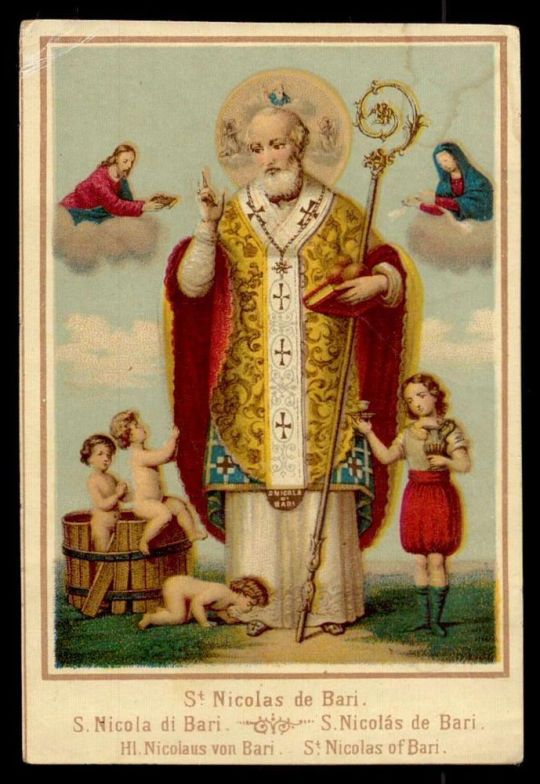
Today is the Feast Day of Saint Nicholas of Bari, Bishop and Confessor - Feast Day - December 6th
The real Saint Nicholas was a legendary figure – a muscular and generous Christian bishop — in his own time. He saved girls from sexual slavery, raised people from the dead, was thrown into prison for his Christianity, and even punched a famous heretic at a church council.
by Father Francis Xavier Weninger, 1876
Saint Nicholas, whom the Almighty honored with numberless miracles, was born at Patara, in Lycia, of rich and pious parents, who having lived a long time without issue, at last, after many prayers, were rejoiced by the Lord with a son. It was a remarkable fact that Nicholas, when an infant, on Wednesdays and Fridays, refused to take nourishment from his mother’s breast until nightfall; and this custom of partaking of no food on those days, he observed as long as he lived. When sent to school, he carefully avoided all interaction young men, and still more with the other sex. He shunned all occasions of evil, chastised his body by watching, fasting, wearing a penitential girdle, and read only such books as aided him to acquire virtue and knowledge. In this manner he preserved his innocence inviolate through all dangers. Having made great progress in virtue and knowledge, he was ordained priest by the bishop of Myra, who was his God-father. As he felt himself obliged by the sacredness of his station to strive to attain greater virtue, he redoubled his austerities, his fervor in prayer, and his zeal in doing good. The rich inheritance which came into his possession after the death of his parents, was employed only to relieve and comfort the needy.
Among these were three young virgins whom their father, impoverished by misfortune, had advised to maintain themselves at the cost of their virtue, as he saw no means to provide for them. St. Nicholas, having heard this, went, during the night and threw into the father’s room, through the window, as much money as was necessary to give one of the three maidens a marriage dower. The same was done, after a lapse of some time, for the second and the third; and, by this noble work of charity, the father and the daughters were saved from temporal and eternal ruin. After some time, by order of the bishop of Myra, Nicholas was charged with the care of a monastery, and performed this task with great prudence and care.
Meanwhile, his heart was filled with the desire to visit the Holy Land, and to pass the remainder of his life in solitude. The day on which he set sail he prophesied to the sailors that they would soon encounter a severe storm. The sailors, thinking they were better skilled in such matters, laughed at him, but the issue showed that the Saint was right; for so terrific a storm arose that all on board thought themselves lost. Hence they begged the Saint, as God had revealed to him the danger, to implore Him to turn it from them. Hardly had the holy man begun to pray when the winds abated and the storm ceased. Similar miracles the holy man performed frequently; hence he is honored and invoked as a special patron of sailors. In Palestine he visited the holy places with great devotion, and made the resolution to remain there in some retired spot, where he might serve the Almighty undisturbed. But, by divine admonition, he returned to his monastery, where he did not remain long, as God inspired him to go to Myra, the capital of Lycia.
The bishops of that country had just assembled at Myra, to elect a successor to the late bishop, and while they were praying to be guided by heaven in their choice, God revealed to one of them that they should choose him who, on the following morning, should first enter the church, and whose name was Nicholas. St. Nicholas, knowing nothing of what had passed, was the first who entered the church the next morning. A bishop who had been appointed to be there, having asked his name, took him by the hand and led him to the assembled prelates, who informed him of the divine will and consecrated him bishop in spite of the tears he shed and the objections he offered.
Nicholas considering that so high an office required high virtues, endeavored to lead a still more perfect life than before. He practised severe penance, partook daily of one meal only, and never touched meat; took his short rest on the bare floor, gave all the time left to him from the administration of his functions to prayer, daily said holy Mass, at which he often shed many tears; visited the prisoners, the sick, and the poor of the city, among whom he divided almost all his income; preached on all Sundays and Holydays, and frequently visited the churches and parishes of his diocese, providing all with able priests and a sufficient income. In one word, he did all that could be expected of a bishop, who perfectly fulfilled his sacred duties. At that period there were still many pagans in Myra, besides an idolatrous temple, and the emperor sent his officers to exterminate Christianity and restore the pagan worship. On this occasion our holy bishop showed his generous seal. He went through all the streets and into all the houses exhorting the Christians to remain faithful to Christ, without fearing for himself either danger, persecution or death. He was seized, dragged out of the city, and cast into a dungeon, where he remained until Constantine the Great ascended the throne. The holy bishop experienced the greatest joy when this emperor gave orders to demolish the idolatrous temples and to build churches in their places. He himself assisted at the work and rested not until all pagan temples had disappeared from his diocese. Some time later an opportunity presented itself to him to fight against the Arian heresy, which he condemned in the Council of Nice.
The many and great miracles that he performed and the fame of his holiness gave him great consideration. Eustathius, an avaricious officer, had condemned to death three innocent citizens, living not far from Myra, in order that he might take possession of their property. No sooner had St. Nicholas been informed of this than he hastened to the place, where he found the three men already in the hands of the executioner. The Saint ran towards him and took the sword from him; he then reproved the wicked judge with severe words, and thus freed the innocent persons, amid the great rejoicings of the people.
Still more remarkable is the following: Constantine, the emperor, had condemned three of his most renowned generals to death, on false accusations. These, having heard much of the holiness of the Bishop of Myra, called on God to come to their aid for the sake of His servant. In the night before the day on which the sentence on the three prisoners was to be executed, Constantine saw St. Nicholas standing before him, threatening him with divine vengeance if he did not immediately recall the sentence against the innocent men. In the same manner the Saint appeared to the unjust accuser. Both, greatly frightened, set the prisoners free, and sent them with many rich gifts to St. Nicholas, to thank him for having thus protected them.
Almost at the same time the Saint appeared to some sailors who were in great danger of being wrecked, and had invoked him. They saw him at the helm, guiding the ship safely to land. When they expressed their gratitude to him, he said: “My children, give honor to God; I am but a poor sinner.” Taking them aside, he said that their sins, which he named to them, had been the cause of the danger they experienced, admonished them to repent, and then dismissed them. On account of this and numberless other miracles, the holy bishop was called the Thaumaturgus, or Wonder-worker of his age. All his biographers unite in saying that he raised many dead to life. Among these were three children who had been-cruelly murdered and cast into a tub; and this miracle is frequently represented by artists in their pictures of the Saint.
Although St. Nicholas was gifted with such high graces, and administered his episcopal functions so well, he yet feared that he did not do enough, and frequently prayed to God to release him from this burden. A voice from heaven, however, encouraged him, saying: “Fear not, Nicholas, I will recompense thy faithful services.” God also revealed to him the day and hour of his death, and the Saint, rejoicing soon to see the Lord, received with great devotion, the holy Sacraments, and after a short sickness ended his holy life.
In his last moments he saw heaven open, and a great multitude of angels came to accompany his soul to heaven. His last prayer was the Psalm, “In Thee, O Lord, have I hoped.” When he came to the words, “Into Thy hands I commend my spirit,” he calmly expired. From his body emanated a miraculous oil, which restored the health of many sick. This oil is still flowing at Bari, in Apulia, where the holy body is enshrined, and is yearly visited by many devout pilgrims.
St. Nicholas of Bari, Bishop and Confessor (†343; Feast – December 6)
Divine Wisdom has willed that on the way which leads to the Messias, our great High Priest, there should be many Pontiffs to pay Him the honor due to Him. Two Popes, St. Melchiades and St. Damasus; two Doctors, St. Peter Chrysologus and St. Ambrose; and two Bishops, St. Nicholas and St. Eusebius—these are the glorious Pontiffs who have been entrusted with the charge of preparing, by their prayers, the way of the Christian people towards Him, Who is the Sovereign Priest according to the Order of Melchisedech. Today the Church celebrates with joy the Feast of the great wonder–worker Nicholas, who is to the Eastern Church what St. Martin of Tours is to the West. The Church of Rome has honored the name of St. Nicholas for nearly a thousand years (especially since the translation of the majority of his relics to Bari in 1087). Let us admire the wonderful power which God gave him over creation; but let us offer him our most fervent congratulations for that he was permitted to be one of the three hundred and eighteen Bishops, who proclaimed, at Nicaea, that the Word is consubstantial with the Father. The humiliations of the Son of God did not scandalize him. Neither the lowliness of the flesh, which the sovereign Lord of all things assumed to Himself in the womb of the Virgin, nor the poverty of the crib, hindered him from confessing the Son of Mary to be Son of God, equal to God; and for this reason, God has glorified this His servant, and given him the power to obtain, each year, for the children of the true Church, the grace of receiving this same Jesus, the Word made flesh, with simple faith and fervent love.
At the Council of Nicaea, St. Nicholas slapped Arius in the face for teaching that Christ was a created being instead of eternally one with the Father and the Holy Ghost. This action was in conflict with the directions of the Emperor, so the Bishop of Myra was brought before Constantine to answer for himself. The Emperor wisely deferred judgment to the Fathers of the Council, but this resulted in St. Nicholas being deposed as bishop. However, several of the Council Fathers that night shared a dream in which they saw St. Nicholas reinstated as bishop by Christ and His Holy Mother Mary. The next day, St. Nicholas was reinstated as bishop and treated with respect. It is possible that this incident accounts for his reputation as one who punishes bad children at Christmas (or on the eve of his feast) as well as rewarding good children.
Let us now listen to the eulogy of St. Nicholas, which the Roman Church has inserted in Her liturgy:
St. Nicholas was born of a noble family at Patara, in the province of Lycia. His birth was the fruit of his parents’ prayers. Evidence of his great future holiness was given from his very cradle. For when he was an infant, he would take his food only once on Wednesdays and Fridays, and then not till evening; whilst on all other days he nursed frequently: he kept up this custom of fasting during the rest of his life. Having lost his parents when he was a boy, he gave all his goods to the poor. Of his Christian kindheartedness there is the following noble example. One of his fellow citizens had three daughters; but being too poor to obtain them an honorable marriage, he was minded to abandon them to a life of prostitution. St. Nicholas having come to know the case, went to the house during the night, and threw in by the window a sum of money sufficient for the dowry of one of the daughters; he did the same a second and third time; and thus the three were married to respectable men.
Having given himself wholly to the service of God, he set out for Palestine, that he might visit and venerate the holy places. During this pilgrimage, which he made by sea, he foretold to the mariners on embarking, though the heavens were then serene and the sea tranquil, that they would be overtaken by a frightful storm. In a very short time the storm arose. All were in the most imminent danger, when he quelled it by his prayers. His pilgrimage ended, he returned home, giving to all men example of the greatest sanctity. He went, by an inspiration from God, to Myra the metropolis of Lycia, which had just lost its bishop to death, and the bishops of the province had come together for the purpose of electing a successor. Whilst they were holding a council for the election, they were told by a revelation from Heaven, that they should choose him who, on the morrow, should be the first to enter the church, his name being Nicholas. Accordingly, the requisite observations were made, when they found St. Nicholas to be waiting at the church door: they took him, and, to the incredible delight of all, made him the Bishop of Myra. During his episcopate, he never flagged in the virtues looked for in a bishop: chastity, which indeed he had always preserved, gravity, assiduity in prayer, watchings, abstinence, generosity, and hospitality, meekness in exhortation, severity in reproving.
He befriended widows and orphans by money, by advice, and by every service in his power. So zealous a defender was he of all who suffered oppression, that, on one occasion, three tribunes having been condemned by the Emperor Constantine (who had been deceived by calumny) and having heard of the miracles wrought by St. Nicholas, they recommended themselves to his prayers, though he was living at a very great distance from that place; the Saint appeared to Constantine, and looking angrily upon him, obtained from the terrified Emperor their deliverance. Having, contrary to the edict of Diocletian and Maximian, preached in Myra the truth of the Christian Faith, he was taken off to a great distance and thrown in prison, where he remained until Constantine, having become Emperor, ordered his release, and the Saint returned to Myra. Shortly afterwards, he repaired to the Council which was being held in Nicaea: there he took part with the three hundred and eighteen Fathers in condemning the Arian heresy. Scarcely had he returned to his see, than he was taken with the sickness of which he soon died. Looking up to Heaven, and seeing Angels coming to meet him, he began the Psalm, “In Thee, O Lord, have I hoped;” and having come to those words, “Into Thy hands I commend my spirit,” his soul took its flight to the heavenly country. His body, having been translated to Bari in Apulia, is the object of universal veneration.
Almost all the breviaries of the Latin Church, up to the seventeenth century, contained most fervent praises of the virtues and miracles of St. Nicholas, and give more explicitly some circumstances of the Saint’s life than is in the above Lessons. The following portions of this Office dwell with complacency on a fact which is not mentioned in our more recent liturgy—we mean the miraculous oil, which, for more than 900 years, has flowed from the tomb of the holy Bishop, and by means of which God has frequently wrought miracles. The responsory and antiphon below were formerly so familiar to the faithful, that in the thirteenth century their music was sung to the responsory Unus Panis, and to the antiphon O quam suavis est, of the Office of Corpus Christi:
R. From his marble tomb there flows a holy oil, wherewith the blind are anointed and healed: * The deaf recover their hearing: and the weak return home strong. V. The people rush in crowds, desiring to witness the wonderful works which are done by him. * The deaf…
Ant. Oh! the mercy of Christ, worthy of all our praise, which makes known, through the length and breadth of the world, the merits of his servant Nicholas: for from his tomb there flows an oil, and it heals all that are infirm.
Novena Prayer of Petition to St. Nicholas
(Also can be said separate from the Novena)
Glorious Nicholas, my own protector! from that bright throne where thou dost enjoy the vision of thy God, in pity turn thine eyes upon me; ask for me from God those graces and helps most seasonable in my present necessities, whether spiritual or temporal, and especially the grace of . . . . . . if such be expedient for my eternal welfare. Forget not, glorious and holy bishop, our Sovereign Pontiff, the holy Church, and this pious city. Bring back to the right way of salvation those who live steeped in sin, or buried in the darkness of ignorance, error, and heresy. Comfort the sorrowing, provide for the needy, strengthen the weak-hearted, defend the oppressed, help the sick; let all know the effects of thy powerful patronage with Him Who is the supreme giver of all good. Amen
Our Father, Hail Mary, Glory be to the Father.
V. Pray for us, blessed Nicholas.
R. That we may made worthy of the promises of Christ.
Let us pray:
God, Who has honored, and ceasest not daily to honor, Thy high-priest and glorious confessor, blessed Nicholas, with innumerable miracles: grant, we beseech Thee, that, by his merits and prayers, we may be delivered from the fires of hell and from all other dangers. Through Christ our Lord. Amen.
(Indulgence of 50 days, Pope Gregory XVI., 1880)
In 1087 Italian merchants stole his body at Myra, bringing it to Bari in Italy. His representations in art are as various as his alleged miracles. In Germany, Switzerland, and the Netherlands, they have the custom of making him the secret purveyor of gifts to children on 6 December, the day on which the Church celebrates his feast; in the United States and some other countries St. Nicholas has become identified with Santa Claus who distributes gifts to children on Christmas eve. His relics are still preserved in the church of San Nicola in Bari; up to the present day an oily substance, known as Manna di S. Nicola, which is highly valued for its medicinal powers, is said to flow from them.
24 notes
·
View notes